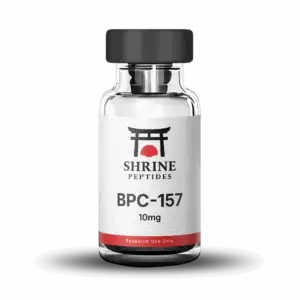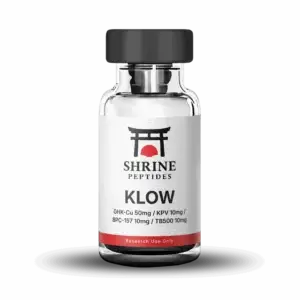TB-500 (5mg)
$82.00
TB-500 (5mg) – Research grade peptide for laboratory investigations and preclinical studies | Research Use Only – Not for Human Consumption
TB-500 (5mg) Research Compound
Research Use Only – Not for Human or Animal Consumption
TB-500 (5mg) is a synthetic research peptide that has been investigated in laboratory settings for its potential interactions with various biological pathways. This research compound has been studied in preclinical models to evaluate its pharmacological properties and potential mechanisms of action.1 Preliminary investigations have examined this peptide’s effects on cellular signaling pathways, receptor interactions, and physiological responses in controlled laboratory environments.
Research Overview
Laboratory studies have explored the potential biological activities of TB-500 (5mg) through various experimental methodologies. Research has focused on characterizing the peptide’s structure-activity relationships, binding affinities to target receptors, and downstream signaling cascade activation.2 Preclinical investigations have utilized multiple research models to assess the compound’s pharmacokinetic properties, including absorption, distribution, metabolism, and elimination characteristics. These fundamental research efforts contribute to the broader understanding of peptide-based signaling mechanisms and their potential applications in biological research.
Preclinical Investigations
Research teams have conducted systematic investigations to evaluate TB-500 (5mg)’s biological activities in controlled experimental settings. Studies have employed various in vitro and in vivo methodologies to assess the peptide’s effects on cellular processes, tissue function, and systemic responses in research models.3 Data from these investigations have contributed to understanding the peptide’s potential mechanisms of action, optimal dosing parameters for research applications, and potential interactions with biological systems.
Product Specifications
- Contents: TB-500 (5mg)
- Form: Lyophilized powder
- Purity: >98% (verified by HPLC)
- Storage: Store at -20°C in a dry environment
- Reconstitution: Use bacteriostatic water for laboratory applications
- Stability: Stable when stored properly under recommended conditions
Quality Assurance and Documentation
- Third-party laboratory tested for purity and identity verification
- Certificate of Analysis (COA) available upon request for each batch
- HPLC chromatography results provided
- Mass spectrometry data available
- Manufactured under strict quality control protocols
- Batch-specific documentation and traceability
- Compliance with research-grade standards
Research Applications
- Peptide receptor interaction studies
- Cellular signaling pathway research
- Pharmacokinetic and pharmacodynamic investigations
- Structure-activity relationship studies
- Preclinical model research
- Biochemical pathway mapping
- Molecular mechanism elucidation
- In vitro biological activity screening
- Peptide stability and formulation research
- Comparative peptide pharmacology studies
Important Research Notice
FOR LABORATORY AND RESEARCH USE ONLY. This product is intended exclusively for scientific research, in vitro studies, and laboratory investigations. This compound is not intended for human or animal consumption, clinical applications, or any diagnostic or therapeutic uses.
Researchers should consult relevant scientific literature and follow appropriate safety protocols when handling this research compound. Proper laboratory equipment, personal protective equipment, and training are required for working with this material.
Regulatory Compliance Statement
This product is sold as a research chemical for laboratory use only. Shrine Peptides operates as a chemical supplier. Shrine Peptides is not a compounding pharmacy or chemical compounding facility as defined under 503A of the Federal Food, Drug, and Cosmetic Act. Shrine Peptides is not an outsourcing facility as defined under 503B of the Federal Food, Drug, and Cosmetic Act.
The statements made within this product description have not been evaluated by the US Food and Drug Administration. The products we offer are not intended to diagnose, treat, cure or prevent any disease. Human/Animal Consumption Prohibited. Laboratory/In-Vitro Experimental Use Only.
Please review and adhere to our Terms and Conditions before ordering.
References:
- Kleinman HK, Sosne G. Thymosin β4 Promotes Dermal Healing. Vitam Horm. 2016;102:251-75. doi: 10.1016/bs.vh.2016.04.005. Epub 2016 May 24.
- Ho EN, Kwok WH, Lau MY, Wong AS, Wan TS, Lam KK, Schiff PJ, Stewart BD. Doping control analysis of TB-500, a synthetic version of an active region of thymosin β₄, in equine urine and plasma by liquid chromatography-mass spectrometry. J Chromatogr A. 2012 Nov 23;1265:57-69. doi: 10.1016/j.chroma.2012.09.043. Epub 2012 Sep 23.
- Gurtner GC, Werner S, Barrandon Y, Longaker MT. Wound repair and regeneration. Nature. 2008 May 15;453(7193):314-21. doi: 10.1038/nature07039. PMID: 18480812.
- Santra, M., Zhang, Z. G., Yang, J., Santra, S., Santra, S., Chopp, M., & Morris, D. C. (2014). Thymosin β4 up-regulation of microRNA-146a promotes oligodendrocyte differentiation and suppression of the Toll-like proinflammatory pathway. The Journal of biological chemistry, 289(28), 19508–19518. https://doi.org/10.1074/jbc.M113.529966
- Katherine M. Malinda et.al, Thymosin β4 Accelerates Wound Healing, Journal of Investigative Dermatology, Volume 113, Issue 3, 1999, Pages 364-368, ISSN 0022-202X.
- Treadwell T, Kleinman HK, Crockford D, Hardy MA, Guarnera GT, Goldstein AL. The regenerative peptide thymosin β4 accelerates the rate of dermal healing in preclinical animal models and in patients. Ann N Y Acad Sci. 2012 Oct.
- Wei C, Kim IK, Li L, Wu L, Gupta S. Thymosin Beta 4 protects mice from monocrotaline-induced pulmonary hypertension and right ventricular hypertrophy. PLoS One. 2014 Nov 20;9(11):e110598.
- Srivastava, D., Ieda, M., Fu, J., & Qian, L. (2012). Cardiac repair with thymosin β4 and cardiac reprogramming factors. Annals of the New York Academy of Sciences, 1270, 66–72. https://doi.org/10.1111/j.1749-6632.2012.06696.x
- Bock-Marquette, I., Saxena, A., White, M. D., Dimaio, J. M., & Srivastava, D. (2004). Thymosin beta4 activates integrin-linked kinase and promotes cardiac cell migration, survival and cardiac repair. Nature, 432(7016), 466–472. https://doi.org/10.1038/nature03000
- Gao, Xy., Hou, F., Zhang, Zp. et al. Role of thymosin beta 4 in hair growth. Mol Genet Genomics 291, 1639–1646 (2016).
- Huff, T., Müller, C. S., Otto, A. M., Netzker, R., & Hannappel, E. (2001). beta-Thymosins, small acidic peptides with multiple functions. The international journal of biochemistry & cell biology, 33(3), 205–220. https://doi.org/10.1016/s1357-2725(00)00087-x
- Freeman, K. W., Bowman, B. R., & Zetter, B. R. (2011). Regenerative protein thymosin beta-4 is a novel regulator of purinergic signaling. FASEB journal : official publication of the Federation of American Societies for Experimental Biology, 25(3), 907–915. https://doi.org/10.1096/fj.10-169417
- Lv, S., Cai, H., Xu, Y., Dai, J., Rong, X., & Zheng, L. (2020). Thymosin‑β 4 induces angiogenesis in critical limb ischemia mice via regulating Notch/NF‑κB pathway. International journal of molecular medicine, 46(4), 1347–1358. https://doi.org/10.3892/ijmm.2020.4701
- Sosne, G., Qiu, P., & Kurpakus-Wheater, M. (2007). Thymosin beta 4: A novel corneal wound healing and anti-inflammatory agent. Clinical ophthalmology (Auckland, N.Z.), 1(3), 201–207.








Reviews
There are no reviews yet.